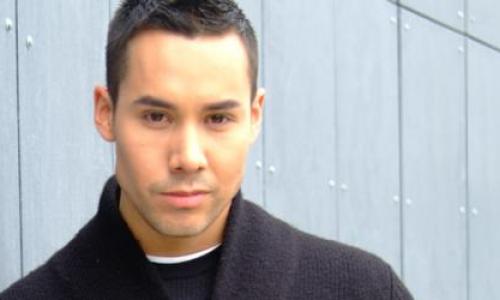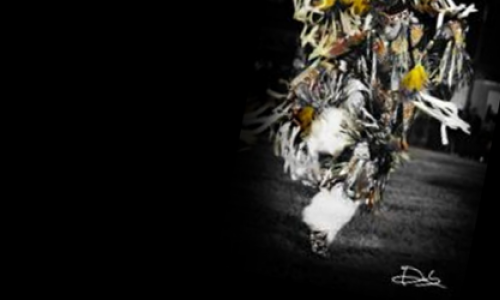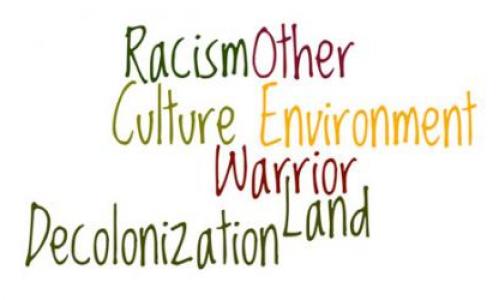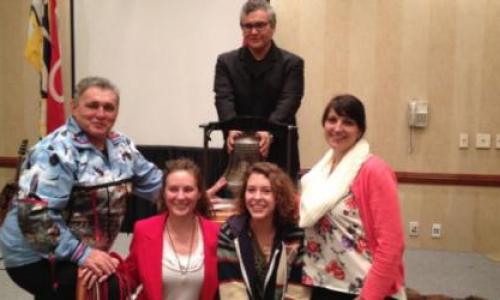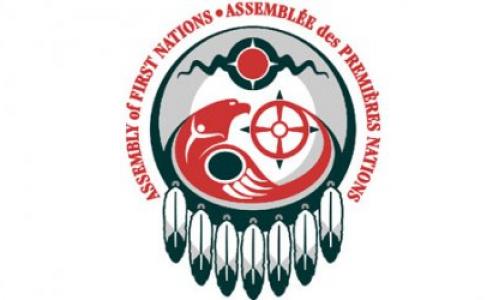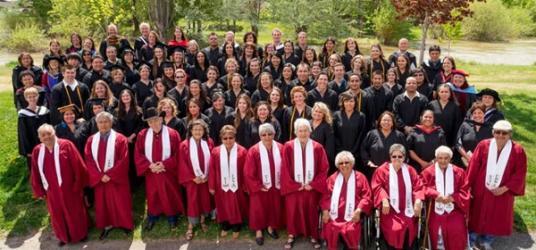
Sandy Coolidge, a 2013 graduate of NVIT's social work program, shares her experiences as a Metis woman and student.
Q: Where did you grow up?
A: Born in Saskatoon Saskatchewan. In 1967 we moved to Osoyoos British Columbia for a few months and then to Oliver. It is Oliver and the Okanagan Territory that I consider to be “where I grew up”. Both sets of my Great-Grandparents on my Mother's side were apart of the group of Metis who left the Red River area and resettled in Batoche.
Q: What were some of the challenges you faced growing up?
A: Where do I begin? My mother had been traumatized in her childhood with alcoholism, violence and racism and this of course influenced her abilities to provide a healthy home life. In spite of her valiant attempts, family violence, physical and sexual abuse, alcoholism, poverty, and constant moves became the norm for me and my siblings as we grew up. This seriously impacted us and especially our education. I ultimately dropped out of school with an eighth grade level education. I left home at 14, and began my own journey into the challenges of life.
Q: What is your happiest childhood memory?
A: When we lived in Oliver we connected with a family (Marcus and Doreen) who would be and are key to who I am today. They were instrumental in helping me to find my identity, which included discovering connections I had never experienced to the people, the land and to the ‘Spirit’.
Q: When did you start thinking about attending post-secondary?
A: I have always thought about attending post-secondary schooling, but life seemed to get in the way, that and my own fears and insecurities. I have taken different courses throughout my life, but always under it was the desire to get a degree. Too many times I let my fear and “logic” talk me out of the very long and involved commitment of obtaining a degree.
Q: What were some of the reasons you decided to further your education?
A: In many ways I saw it as “my last chance” to get a degree. I was 48 years old when I made the decision. I also saw the timing as perfect in that my youngest daughter would soon be graduating high school and not dependent on me anymore. So I did my first two years in Vernon and by the time I was ready to transfer to a University my youngest graduated and stayed in our home while I went off to Merritt (NVIT) to start the third year Social Work program.
Q: Share your experience of:
Getting funding (sponsorship, student loan, scholarship etc.)
A:
-
I got student loans for the first two years. The application process for student loans is easy and online. There are a couple things that I found out though – you can’t have too much money in your bank account, and if you have a newer car (including a leased one) the value of the car is included with money you have available to you. The message there is, do not lease or buy a car worth more than $5000, because if I remember correctly, dollar for dollar over that amount will be deducted from the amount you will receive.
-
My last two years of funding came from Metis Employment and Training. I saved it for the last two years as that is the more expensive part of the degree (although NVIT tuition is much lower than other institutions).
-
The application process for this funding was a lot more involved and felt overwhelming at times. A lot of information had to be gathered and they are very particular on what is required. I would recommend looking into it a year before you need it and to be on it as soon as possible as there is a limited number they can sponsor. Also, the application only applies to one year, so the same process must be completed for the second year.
Academic standards
-
I feel very fortunate that I attended Okanagan College for my first two year as it gave me a firm foundation in academic writing and expectations. My last two years was sometimes challenging, but because of a couple key instructors in the program, I managed to work through it. Looking back, I would not trade anything for the lessons I learned from those passionate instructors. In particular, the course on Decolonization was the most foundational and impacting teaching of the entire four years—thank you Elaine Herbert!!
Q: Share a time when you wanted to quit.
A: I never felt like I had the luxury to quit, as my age was against me. If I had been younger, I think I might have taken a break in the first semester of my 4th year, as two of the classes focused a lot on family violence and trauma. I had extreme difficulty that semester as I became aware that unaddressed trauma from my own life was being triggered by some of the readings and discussions in class. I also realized that if I were to address these things, I would not be able to complete my schoolwork (as it was I ended up getting deferrals for the two final assignments) so I chose to tuck it away, so to speak, and to deal with it once I completed my degree.
Q: Share your proudest moment.
A: My proudest awareness came at the beginning of the 2012 Fall Semester when I realized that my three daughters, my niece and I were all pursuing degrees, (as well, my little great niece was starting kindergarten). Included in this “proudest moment” is the awareness that my mother received her degree later on in life, and as well, that my brother holds a Masters degree and my sister recently obtained a Culinary Arts diploma.
And then just today, I received a message from my other niece:
“Congratulations [Aunty] on your graduation, I am so proud of you. You have taught me that hard work and dedication pays off. You have inspired me to go after my dream of becoming a youth outreach worker… you have given me the hope that I will also be able to achieve my dreams”.
Q: Where are you currently in respect to your education? Do you think you are finished? Or do you wish to go further?
A: I have a love/hate relationship with school. I love the learning and the discussions, but I feel like writing papers is a torture I could live without for the rest of my days, so I am not sure. I do know that I will likely take more, maybe even pursue my Masters, but I do know that once a person hits a certain age many college courses are free, so you just never know.
Q: What advice do you have to offer other Indigenous students?
A:
-
Don’t be shy about asking for help and/or for clarification if you don’t understand something
-
Come to class prepared and take notes
-
Don’t miss a class unless it is completely unavoidable
-
Don’t create a habit of buying lunch as the cost adds up, as will the pounds. Bring your own lunch, drink lots of water and find time to enjoy being in the fresh air.
-
Don’t be afraid to get involved in the Indigenous resources available regardless of how ‘fair’ you look.
-
Find students with the same commitment you have to being a successful student
-
This isn’t high school, so if they say no late assignments will be accepted, they mean it (that is unless you have talked to the professor earlier and he or she has given an extension)
** Remember: You are never, never too old to fulfill your academic dream!!











